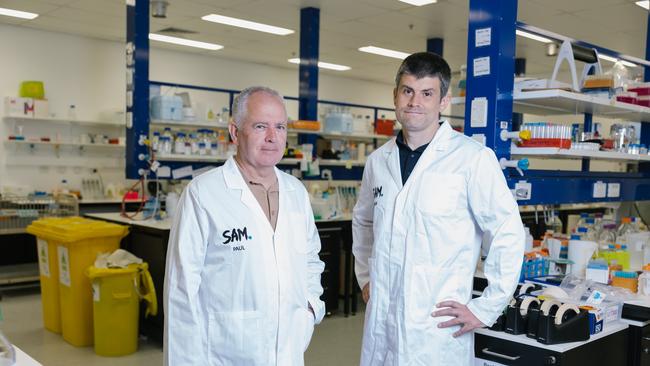Samsara Eco is building Australia’s first ‘infinite recycling’ research and development facility
Flush with a $56m funding from Woolworths and Main Sequence, Samsara Eco is ready to break out of the lab with its technology that breaks down plastic in minutes rather than centuries.

Fresh off a $56m funding round, Australian envirotech start-up Samsara Eco is expanding outside the lab, building what it says will be the nation’s first infinite recycling research and development facility as it moves towards its goal of recycling 1.5 million tonnes of plastic a year by 2030.
Until now based at the research laboratories of the Australian National University, Samsara Eco chief executive and founder Paul Riley said his start-up would work to commercialise its breakthrough science, which can break plastic down to its core molecules which can then be used to create new plastic.
The new $25m facility will be located within the Poplars Innovation Precinct at Jerrabomberra, Queanbeyan, in regional NSW, and will be solely focused on accelerating Samsara Eco’s scientific research. It’s set to be operational by late 2024.
“You can’t solve the climate crisis unless you solve the plastics crisis,” Mr Riley said.
“Plastic is one of the greatest inventions of the 20th century and provides enormous utility because of its durability, flexibility and strength. Yet, it’s also an environmental disaster with almost every piece of the 9 billion tonnes ever made still on the planet.”
Samsara obtains waste material from Australia’s materials recovery facilities and uses an enzyme to break down plastics to their core monomers – a process Mr Riley said took as little as 10 minutes. The product can then be used infinitely to make new products. Its initial customers include Lululemon and Woolworths, and the company is expanding operations into Europe and North America.
“We’ve got a whole range of partners we’ve established across packaging, fashion and the automotive sectors,” Mr Riley said.
“They’re developing products to replace fossil fuel plastics in their supply chains. In Europe you have legislation in place for minimum recycled content, for example, and that supports and drives investment into the advanced recycling space.
“I think Australia needs to be more ambitious, I think we’ve seen that self-regulation hasn’t worked and we should be driving for minimum recycled content across both fashion and packaging.”

Mr Riley was previously involved in private equity and venture capital before working as an entrepreneur-in-residence at Main Sequence, which invested in Samsara Eco’s Series A funding round late last year alongside Breakthrough Victoria, Temasek, Assembly Climate Capital, DCVC and INP Capital, Woolworths Group’s W23 and the Clean Energy Finance Corporation Innovation Fund.
The CSIRO-linked Main Sequence in July received $450m for its third fund, passing $1bn in funds under management.
“Our pitch to our partners has been well received,” Mr Riley said. “We have a superior product, it’s sustainably produced. And we can help them meet or assist them in meeting their net zero targets, and we can meet market price, so there is no impediment then to using the product.
“Needless to say we’ve got a very, very high level of engagement across a lot of companies.
“Our challenge at the moment is being able to make sufficient trial product to meet that demand. And that’s where the new facility is going to be really helpful in being able to make a lot more trial product for our partners.”
Mr Riley said Samsara Eco would continue to partner with ANU as it scales up its technology towards commercialisation.
“We’ve had fantastic growth out of our ANU lab so far, but the plastic problem is growing fast,” he said.
“As we gear up towards commercialisation, access to our first R&D facility will enable us to accelerate the capabilities of infinite recycling and scale our solution which breaks down plastics in minutes, not centuries.”
Samsara Eco will be the anchor tenant of Poplars Innovation Precinct which is adjacent to the ACT-NSW border. Poplars will deliver a bespoke facility for Samsara including offices, laboratories and R&D workshop.
Queanbeyan-Palerang Regional Council Mayor Kenrick Winchester said: “Council shares Poplars Developments’ vision that focuses on attracting defence, space, cyber security, information technology and scientific research sectors to the new precinct.
“Samsara Eco’s innovative technology has the potential to put Queanbeyan and Jerrabomberra on the international stage as countries all over the world look for ways to reduce waste and work toward net-zero carbon emissions.
“We hope that securing Samsara Eco is the first of many new and exciting initiatives for the precinct and we look forward to the employment opportunities the precinct will provide.”






To join the conversation, please log in. Don't have an account? Register
Join the conversation, you are commenting as Logout